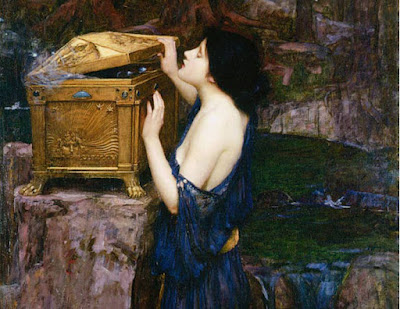PANDORA was modeled by Hephaestus in the likeness of Aphrodite. He carved her out of a block of white marble, made her lips of red rubies and her eyes of sparkling sapphires. Athena breathed life into her and dressed her in elegant garments. Aphrodite decked her with jewels and fixed her red mouth in a winning smile. Into the mind of this beautiful creature, Zeus put insatiable curiosity, and then he gave her a sealed jar and warned her never to open it.
Hermes brought Pandora down to earth and offered her in marriage to Epimetheus, who lived among the mortals. Epimetheus had been warned by Prometheus never to accept a gift from Zeus, but he could not resist the beautiful woman. Thus Pandora came to live among mortals, and men came from near and far to stand awestruck by her wondrous beauty.
But Pandora was not perfectly happy, for she did not know what was in the jar that Zeus had given her. It was not long before her curiosity got the better of her and she had to take a quick peek. The moment she opened the lid, out swarmed a horde of miseries: Greed, Vanity, Slander, Envy, and all the evils that until then had been unknown to mankind. Horrified at what she had done, Pandora clapped the lid on, just in time to keep Hope from flying away too. Zeus had put Hope at the bottom of the jar, and the unleashed miseries would quickly
have put an end to it. They stung and bit the mortals as Zeus had planned, but their sufferings made them wicked instead of good, as Zeus had hoped. They lied, they stole, and they killed each other and became so evil that Zeus in disgust decided to drown them in a flood.
But there was one man on earth who had not turned evil. He was a son of Prometheus. His name was Deucalion.
Hermes brought Pandora down to earth and offered her in marriage to Epimetheus, who lived among the mortals. Epimetheus had been warned by Prometheus never to accept a gift from Zeus, but he could not resist the beautiful woman. Thus Pandora came to live among mortals, and men came from near and far to stand awestruck by her wondrous beauty.
But Pandora was not perfectly happy, for she did not know what was in the jar that Zeus had given her. It was not long before her curiosity got the better of her and she had to take a quick peek. The moment she opened the lid, out swarmed a horde of miseries: Greed, Vanity, Slander, Envy, and all the evils that until then had been unknown to mankind. Horrified at what she had done, Pandora clapped the lid on, just in time to keep Hope from flying away too. Zeus had put Hope at the bottom of the jar, and the unleashed miseries would quickly
have put an end to it. They stung and bit the mortals as Zeus had planned, but their sufferings made them wicked instead of good, as Zeus had hoped. They lied, they stole, and they killed each other and became so evil that Zeus in disgust decided to drown them in a flood.
But there was one man on earth who had not turned evil. He was a son of Prometheus. His name was Deucalion.



Comments
Post a Comment